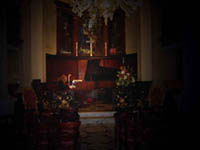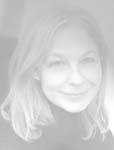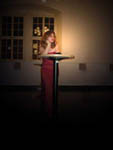1) ![]()
'NEW ON THE SCENE' - Jill Crossland

1)
'NEW ON THE SCENE' - Jill Crossland
'ONE STEP AT A TIME'
Jill Crossland’s career has progressed at a slow and steady pace,but with a new Bach CD she’s been getting much more attention, as she tells Nina Large
Making a name as a pianist on the international concert circuit requires a
feisty blend of determination and tunnel vision ambition. Or so we are led to
believe. But one pianist is fast proving that there is another way: Jill Crossland
has been carving her own path through the competition for several years now
and the release of her first CD with Warner Classics is testament to her success.
Crossland’s journey to the musical heights can hardly be described as
meteoric. Having received a piano for her fifth birthday, she quickly showed
a flair for the instrument, winning talent competitions and performing in festivals,
which led to several interviews in UK press. In those days she had no idea she
was going to be a professional pianist – she was far more interested in
animals, like many little girls. ‘My dad said I always had to tell the
interviewers that I wanted to be a concert pianist. It felt very strange saying
that. It wasn’t until I was about 12 that I realised it actually was what
I wanted to do,’ she remembers. By then, Crossland was studying at Chetham’s
School of Music from where she went to the Royal Northern College of Music (RNCM),
taught at both by Ryszard Bakst.
Unlike others, Crossland has never really had a career game plan: ‘I
go with the flow, I think, I’m not as single-minded as some people can
be. It is a competitive profession but I couldn’t be a pushy
person – it would just never work,’ she says openly. But don’t
read this as laid back or unfocused – she obviously couldn’t be
that, to have achieved what she has. It is refreshing to meet someone who has
bags of passion, talent and drive without it all turning into a frantic scramble
to reach the top of the ladder as quickly as possible. ‘I’m consistent,’
she says. ‘I love music and I devote my life to it – there is nothing
else I could do. But you still take it all as it comes, one step at a time.’


Vienna inspiration
After leaving the RNCM, Crossland’s Edward Boyle Memorial Scholarship
funded her study in Vienna with renowned Mozartian Paul Badura-Skoda. ‘I
really wanted to have some new experiences, I wanted a whole different approach
to my music. I felt that I wasn’t ready to go out there, I needed to develop
more.’ After her time with Badura-Skoda, she worked with the American
teacher Sally Sargent (a pupil of Nadia Boulanger), who gave Crossland the one-to-one
attention she wanted to fine-tune her technique, even making her forgo repertoire
to play a series of specially created exercises to train different muscles and
encourage new skills.
The culture of Vienna is renowned for attracting artistic souls and it was this
rich heritage that encouraged Crossland to remain there for six years instead
of the original 12 months she had planned, working as a répétiteur
for the Vienna State Opera, and later for the Theater an der Wien, as well as
giving solo and chamber music concerts. ‘I often used to visit the houses
of the Schubert, Beethoven, Mozart and Haydn for inspiration,’ she recalls.
‘It’s very moving going to Schubert’s house because it’s
where he died and where he wrote his last piano sonatas and you can listen to
the music that he composed in the house. I don’t necessarily go around
looking for historical facts when I approach music but you can’t help
but be moved by how much someone like Schubert must have suffered in the last
few months of his life, and you can feel it in the music. It gives it all an
extra dimension.’
Crossland embraced the space and the opportunities offered up by these years
abroad, something that defines her whole approach to her career. She balances
her life and work naturally, practising no more than a couple of hours each
day, unless she has a concert. ‘I don’t get consumed. And I teach
as well so that keeps my feet firmly on the ground,’ she says. A few years
back her younger brother Neil, also a pianist, asked Crossland if she wanted
to join him to play a programme of duets at a lunchtime concert in St James’s
Piccadilly. It was to start another chapter. The duo had great success; a talented
and dynamic pair of siblings who performed on BBC Radio 3 and Radio 4 and in
many concerts which put their names right across the UK. But after two years
of doing the duo full time they decided to concentrate on their solo careers
again. ‘I really enjoyed the two years we played together, I think of
it as a sort of lighter time. But I had a real urge to continue doing my solo
things – I felt that I still had a lot more to say,’ says Crossland.
Refreshing Bach
The decision to go back to being solo has certainly paid off. In the 2001-02
season she made her Wigmore Hall debut, and gave a particularly well-received
performance of Bach’s Goldberg Variations in the ‘Fresh’ series
of the Royal Festival Hall – the first of three concerts at the Purcell
Room. She performed in Amsterdam and Den Haag as part of the Anglo-Dutch Piano
Platform and in June she had a solo concert, also at the Purcell Room. Around
this time Warner Classics released her first album, featuring the Goldberg Variations.
Bach has long since been important to her – she was a
semi-finalist at the VII International Bach Competition in Leipzig as a teenager,
and won the RNCM’s Pinsen Book Prize for performing all the Preludes and
Fugues from memory. ‘I feel a real affinity to his music. It satisfies
me in every way, spiritually, mentally and romantically actually – I think
it is very romantic. A lot of people tend to view it as being really
academic, but I don’t. It encompasses so much about life. It’s very
free; you can do what you like with it. Glenn Gould certainly did.’ So
was she inspired or intimidated by Gould’s celebrated Goldberg recording
[1955]? ‘I love his originality, he is just so daring. He is a role model
but I never try and play exactly like him. I have to do it my way – no
one can really get close to Gould’s version.’
The Goldberg disc itself was self-made, recorded in 1997 at the Vestry Hall
Studios in Ealing. It wasn’t until recently that Crossland showed it to
Matthew Cosgrove, Director of Warner Classics, and even then she certainly never
expected him to want to use the original recording.
Unusually, Cosgrove did just that. ‘It really made me sit up and listen,’
says Cosgrove. ‘It was just such a different interpretation, the first
aria in particularly being very slow. I’m really pleased that we have
been able to release it.’ This is seriously good news for Crossland since
the support of one of the major record companies has already started to provide
wider marketing and promotion opportunities such as with a recent trip to Ireland
where Crossland performed with violinist Chloë Hanslip on the hugely popular
Irish TV programme, The Late, Late Show.
Lyrical spirit
Ideas for future recordings have been discussed but nothing is yet confirmed.
Crossland specialises in the Austro-German classics and the Romantic repertoire
of the late 19th century, and is frank about the fact that she has no interest
in contemporary music. ‘It doesn’t appeal to me really – I
like the lyrical things,’ she says. She actually has another two self-made
recordings, on her Calico Classics label: one of Mozart and Beethoven and the
other of Bach. It’s further proof of her can-do attitude – ‘I
wanted to have something ready for my Purcell Room concert,’ she says
practically, ‘So I decided to make them myself.’ We’ll have
to wait and see if Warner is interested, though Crossland already has one dream
project in her mind: to record the complete Bach repertoire on disc. ‘I
want to explore him in every possible way – the repertoire is so rich
and so fascinating and there is so much of it,’ she trills. ‘Including
the chamber music – I love doing that – listening to other people
always helps your musicianship.’
Crossland’s approach has encouraged varied aspects of her musicianship – teaching, duo ensemble, chamber music and répétiteur work – to blend together, making her a thoroughly sensitive soloist. As to a future, she says, ‘I don’t think there is a clear path in this career. It’s a very difficult profession and it’s hard for all artists.’ But, she insists you have to keep going: ‘You have to be strong and take it day by day. I can’t think beyond that really. With some people the ambition is everything, but it’s the music for me. In the end you’ve got to be true to yourself.’
On disc
J S Bach
Goldberg Variations
Warner Classics Apex 0927-49979-2
J S Bach
Partita No 1 in B flat BWV825; English Suite No 2 in A min BWV807; Toccata in
D BWV912, Chromatic Fantasia and Fugue in D min BWV 903
Calico Classics CCCR102
Mozart & Beethoven
Mozart: Sonata K533/494; Beethoven: Sonata op 31 no 2; Sonata op 110
Calico Classics CCCR101
Back to press page
Back to Home page